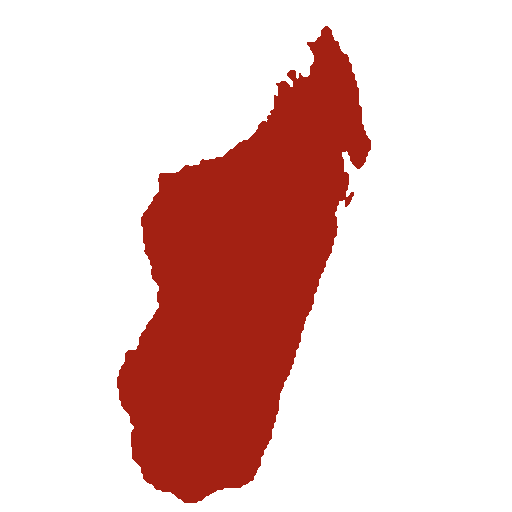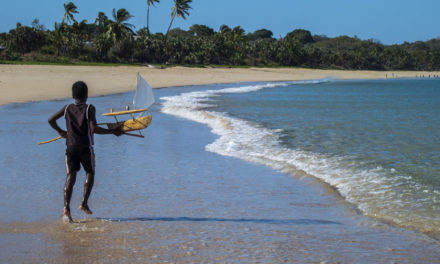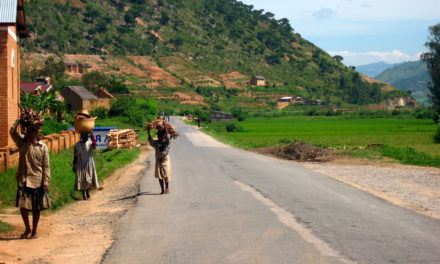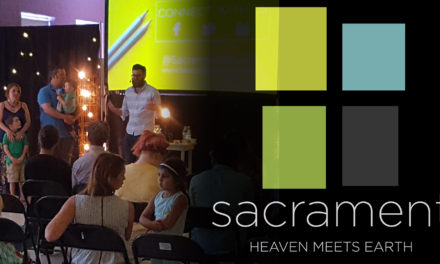
Lora sitting next to the King of the Antakarana as he proclaims to the ancestors the reason for their sacrifice.
T he chanting began as everyone gathered behind the stones. I was summoned, and one older lady came over to help me tie my traditional cloth properly around my body. Then I was told to take off my shoes. She walked with me over the burning hot sand to where everyone was already seated. “Take the clip out of your hair!” the women ordered as someone behind me promptly began to braid my hair. The chanting and clapping continued and swelled. There lay a young cow bound and tied in front of the sacred stones. The king of the Antakarana people stood above the cow as he began to speak to the ancestors, motioning to and fro with a large stick.
As I sat at the front with a perfect view of what was before me, surrounded by rhythmic calls to the ancestors and various men with their arms lifted up in offering, I realized I was witnessing something that has happened since the beginning of time. It’s something most of us have only read about in history books, sociology and anthropology books, and of course the Bible. Throughout the world and its vast array of cultures, sacrifices, whether animal or human, have been viewed as a way to please a deity or higher spiritual power. Whether the sacrifices are for giving thanks, to ask for blessings, or to apologize for doing wrong, the bottom line is that if the spiritual power is made happy then all is made right and put at rest, at least for the time-being. Yet knowing about all of this was nothing compared to witnessing a sacrifice first-hand.
And it’s not just witnessing a sacrifice that adds significance, but also seeing the effects it has on the people who are offering it. Adam recently asked the king of Nosy Mitsio what their community’s greatest fear is as a whole. He said it was the breaking of any taboos, which would in turn anger the ancestors and bring curses on the people. The ancestors are the higher power here. They are the ones who possess people in order to give a set of laws: a list of taboos that cannot be broken. The list grows longer every time a new spirit possession occurs and includes such things as which direction you should face when you sleep, specific places where you should not wear underwear, and on what days you cannot travel long distances.
These taboos dictate how the Antakarana people live, and their sacrifices are often made to initiate communication with the ancestors, to ask for forgiveness when a taboo is broken or to explain big events and changes that are occurring in the community so that the ancestors won’t be surprised and become angry. By giving glory to them with a sacrifice and keeping them informed as to what’s happening, the ancestors are kept happy.
I sat right next to the king of the Antakarana people as he stood communicating with the ancestors. This went on for a while and then all of a sudden he took his stick and gently touched me on the leg, and then used it to point over to where Adam was. This sacrifice was about us! We weren’t just witnessing a sacrifice; we were the reason for doing it. We were the big change happening in their community! The king explained to the ancestors that we are visitors and that we’re here to learn. He asked them not to become angry and curse us or curse the community if we break any taboos because we’re still learning.
E ven despite all that, what struck me the most about the whole thing was the cow that lay right in front of me. His head was pointing toward the sacred stones and he was held down by the four men that had his legs tied on the front and back. He was quite a small cow, and very unimposing. I would’ve thought they’d need to use one of their biggest cows for this sacrifice, one with grand horns that was a picture of strength and might. I’ve seen those cows walking around here before, but this definitely wasn’t one of them. He was small and didn’t put up a fight. The entire time the king stood over him talking to the ancestors, not once did the cow resist. He was completely calm, almost resolute to his fate. And that’s when I no longer saw the cow; I saw Jesus. It was him who was bound and tied, willingly giving himself for the people who had him bound. I realized I was privileged to see this. That’s when I understood in a whole new way what Jesus’s sacrifice meant to the world, and I was humbled to the point of tears.
All around me, hands were lifted in offering and the singing continued, crying out and calling to the ancestors. Yet I was not afraid because I felt the overwhelming presence of the Lord right there with me and among the people. All I could think about was how this has already been done once and for all. This thing that people have done since the beginning of time to try to make things right by offering sacrifices to a higher power, was instead completely turned upside down by God, the highest power of all. He has already offered himself as the sacrifice to make all things right and new in the world, “…entering, not with the blood of goats or calves or some other prescribed animal, but offering His own blood and thus obtaining redemption for us for all time. Think about it: if the blood of bulls or of goats, or the sprinkling of ashes from a heifer restores the defiled to bodily cleanliness and wholeness, then how much more powerful is the blood of the Liberating King, who through the eternal Spirit offered Himself as a spotless sacrifice to God, purifying your conscience from the dead things of the world to the service of the living God?” (Hebrews 9:12-14).
This worship of the ancestors, of the dead already past and still lying in their graves, can only bring death. As Adam wrote in his last newsletter, all that was left after the festival was death. Nothing moved forward. The people walked away, themselves bound by even more taboos than before and by the same fear that enslaves them and cripples them. And the ancestors were only appeased for the time-being. For the Antakarana people, this will always need to continue. But the Holy Spirit reminded me, “They just don’t know.”
O ur God is a living God, having been resurrected to life after death on the cross. That’s what completes the story: that he conquered death itself to bring life abundantly. But even he still walks through these dark places here on earth – just as I felt his Spirit in the middle of the sacrificial ceremonies to the ancestors – he’s always showing us that his power is greater than all the principalities and powers of earth.
And he reminds us why we’re here: to be the hands and feet of him who lives in us and to be the bringers of light to dark places. As the king announced our presence here to their ancestors, they were informed correctly: we are the change that’s happening in their community. We believe that God has already begun working in and through us to display the truth and life of Jesus to the people here.
And he wants the same thing for all of us, wherever we are in the world. How can you help bring the new and abundant life of Jesus into the world today?
In Christ,
Lora, Adam and Matimu Willard








